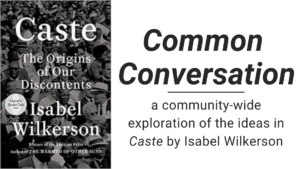
When we talked earlier this year about what we wanted to hold on to from 2020, many of us noted our deeper understanding of racism and a growing commitment to dismantling white supremacy. This understanding and commitment was born of grief and outrage after seeing George Floyd and Breonna Taylor murdered. And then intensified when their killers were not held accountable.
And yet, these incidents of 2020 were only the most recent examples of our country’s longstanding history of racial injustice. Despite what many of us learned in school or from our families of origin, racism has been built into our systems and culture right from the beginning – so much so that Pulitzer-Prize winning author Isabel Wilkerson started to think of it not just as a matter of race but as a matter of caste.
As Wilkerson suggests, caste “is the term that is more precise [than race]; it is more comprehensive, and it gets at the underlying infrastructure that often we cannot see, but that is there undergirding much of the inequality and injustices and disparities that we live within this country…Caste focuses in on the infrastructure of our divisions and the rankings, whereas race is the metric that’s used to determine one’s place in that.”
I have yet to meet someone who encounters Wilkerson’s book, Caste: The Origins of Our Discontents who doesn’t leave thinking, “Everyone should read this!” It’s such a helpful and insightful dive into the underlying structures that we need to address to make real progress on dismantling white supremacy and racism in our country.
For these reasons, we are trying something new over the next few months. We are inviting what we’re calling a “Common Conversation” with Wilkerson’s ideas.
Our goal is to have at least 50% of our congregation be familiar with Wilkerson’s concepts in the next three months – that’s quite a feat! But we’ve set the bar high because we’re confident in our community’s commitment not only to racial justice and healing but to growing our understanding of the systems that perpetuate inequity. Not only did you state that this was one thing you’d want to bring forward from 2020, it’s also a clear part of our Bold Vision (see statement 5!) and a core commitment of our Universalist faith. (Check out this great article from my colleague Nancy McDonald Ladd for a look at this commitment in practice.)
And there’s a reason we’re inviting this conversation now as we launch our series on Tough Love. Diving deeply into these difficult and even painful understandings as a way to bring greater justice and collective liberation is one example of love being tough, resilient, and transformative.
There are many ways to participate in Common Conversation, including reading the book and many that don’t require you to read the full text! (Which is why we didn’t call it a “Common Read.” We want to make this conversation as accessible for as many people as possible!) There’s a lot more information on our Caste webpage – including a way to let us know you are joining the conversation.
I am really looking forward to hearing what you think and considering how we can keep growing and doing better together.
In partnership,
Rev. Gretchen